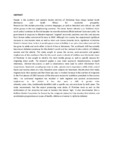Please use this identifier to cite or link to this item:
https://cris.library.msu.ac.zw//handle/11408/1073| Title: | Bulilima’s “Look–South” policy: gender and socio-economic implications | Authors: | Matsa, Mark Matsa, Winniefridah |
Keywords: | Emigrant Brawn-drain Gender Cross-border Bi-sexual |
Issue Date: | 2011 | Publisher: | Organization for Social Science Research in Eastern and Southern Africa | Series/Report no.: | Eastern Africa Social Science Research Review;Vol. 27 no. 1 | Abstract: | People in the southern and western border districts of Zimbabwe have always looked South (Botswana and South Africa) for economic prosperity. Reasons for this include proximity, common languages, as well as historical and cultural ties with ethnic groups in the two neighbouring countries. This trend, herein referred to as ‘Bulilima’s look-south policy’ continues to flourish despite the recently declared official national ‘Look-east policy’ by government in response to Western-imposed ‘targeted’ economic sanctions over the land seizures from former white commercial farmers in 2000. Although the country has experienced significant increase in cross-border trade as well as brain and brawn (muscle) drain, significant in Bulilima District is brawn drain. In fact, it would appear a man in Bulilima is not yet a man unless and until he has gone to settle and work either in South Africa or Botswana. This southward drift has actually become an initiation ceremony for the district’s youth and has reduced it into a district of children, women and the elderly. This study sought to assess the nature, socio-economic and gender implications of this southward flow for the south-western district of Bulilima near the border town of Plumtree. It also sought to identify the most mobile groups as well as specific reasons for migrating down south. The research applies a case study approach. Questionnaires, in-depth interviews, informal discussions as well as observations were used to solicit information from respondents. Systematic sampling was used to select questionnaire respondents while chiefs, school heads and nursing sisters at clinics /hospitals were subjects for interviews. Results show that males migrate more than women and that there was even a marked increase in the number of emigrants in the first decade of 2000 because of the dire socio-economic conditions prevalent in the country then. This southward migration has resulted in both negative and positive socioeconomic implications in the district. It has also seen a shift in gender roles whereby some roles, traditionally identified with a specific sex, are now done by both sexes. The study recommends that the export processing zone status of Plumtree town as well as the dollarization of the economy be used to harness this labour flight. It also recommends that a Bulilima District Association be formed by the emigrants (njivas) to help develop their district, and sensitization programmes on issues of health, children and women’s rights be initiated. | URI: | http://www.ajol.info/index.php/eassrr/article/view/63299 | ISSN: | 1027-1775 |
| Appears in Collections: | Research Papers |
Files in This Item:
| File | Description | Size | Format | |
|---|---|---|---|---|
| ABSTRACT Bulilima.pdf | 294.56 kB | Adobe PDF |  View/Open |
Page view(s)
18
checked on Jul 25, 2024
Download(s)
4
checked on Jul 25, 2024
Google ScholarTM
Check
Items in MSUIR are protected by copyright, with all rights reserved, unless otherwise indicated.



